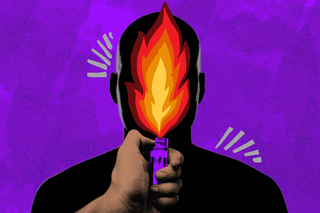
For Survivors of Abuse, Lying Is Freedom. At What Cost?
Lying to abusers is a survival strategy preventing further harm — but it can wreak havoc on people’s mental health.

There’s a pervasive cultural adage that sanctions lying, no matter the circumstance. Growing up, we were taught — through fables and morality tales — that honesty is the best policy, and a liar will not be believed, even when they’re speaking the truth. But as we grew up, we learned that, like most things in the world, the act of manipulating the truth, too, exists across a spectrum of grays. White lies that allow us to spare someone’s feelings and avoid hurting them are considered acceptable — as are lies that allow one to segue into constructive criticism. “We systematically overestimate how uncomfortable truth-telling will be,” says Emma Levine, an associate professor of behavioral science at The University of Chicago Booth School of Business. But conversations surrounding when it’s “acceptable” to lie often ignore situations where lies and deception become a means of survival and self-preservation.
Survivors of abuse can, sometimes, find themselves in situations where they need to exercise their independence without alerting their abuser and angering them — either in a bid to avoid verbal abuse, physical assault, or simply, emotional distress. When one is in a controlling relationship, going for a solo walk at the park, buying a purse with the money one had earned, spending time with one’s friends and colleagues, or even seeing a therapist, can seem like breaking rules set in stone. But in order to preserve one’s sanity — often, by allowing themselves a respite from the company of their abuser — one must break those rules from time to time.
But doing so is laden with the risk of adverse consequences. Tanaya*, 22, recalls that acting independently was a sure-shot way to incur her partner’s wrath and intensify the abuse she was routinely subject to. “I remember one instance where I had to lie about something I had done way before this person even existed in my life. I was afraid of the abuse [I’d endure] if they were reminded of me having had a life outside of the relationship.” Evidently, then, since one can rarely be honest with their abuser without risking further abuse and retaliation, lying and deception become their only tools to exercise their freedom, freely.
This can resemble gaslighting, which is, ironically, a tactic of manipulation — abuse, even — that compels its target to question their memory, sanity, and even their perception of reality. But lying, in this context, is different from gaslighting as a tool of abuse. The latter manifests as a deliberate and malicious act intended to control and manipulate another individual. In contrast, when survivors of abuse gaslight their abusers back, it’s a survival strategy aimed at protecting themselves from further harm.
“I don’t think I’ve consciously resorted to gaslighting ever, but being at the receiving end of violence and wrath left me so scared and intimidated that I had to resort to lying about the smallest of details only to protect myself,” says N., describing her relationship with a man who abused her both physically and emotionally. He would keep track of the tiniest details of every aspect of her life, obsessively monitor her movements, and often confront her with accusations of being unfaithful to him. Lying to him, then, became the only way for her to avoid showdowns that would leave her “numb for days, affect my mental health, and impact my work.” Being a doctor, that meant endangering her patients, too.
Related on The Swaddle:
How Abusers ‘Love Bomb’ People to Manipulate Them Into Relationships
“In these types of situations, lying [to an abuser] for the sake of protecting yourself or [your] loved ones – to escape from [them], protect someone from domestic abuse, [or] protect children from child abuse – is deemed acceptable,” writes Barbara Field, a journalist specializing in mental health.
It’s not just intimate relationships where lying becomes a tool to reclaim one’s independence, though. Families, too, can be just as controlling, if not more. C., says going against her mother’s wishes would trigger fights that left her distressed and drained, making it unsustainable for her to keep standing up for her right to lead her life the way she wants to.
So, like many Indians, she, too, realized that leading a double life was the price she would have to pay for the freedom to be herself without being berated for it. A Google search for “Indians leading double lives,” inundates one with stories of Indian adults — across different socio-economic backgrounds — being forced to hide their true preferences and experiences from their families.
Nonetheless, no matter how useful a tool it might be, lying to some of the most important people in their lives for a prolonged period of time can wreak havoc on people’s mental health. This is where one of the proverbs against lying — “If you tell the truth, you don’t have to remember anything” — holds merit. Narrating her tryst, Tanaya says, “It felt harmless in the moment, but the guilt would always creep up on me sooner or later. I was always worried I’d say something that didn’t match my previous lie and get caught.”
In other words, even though she lied to be able to exercise her free will, she says the anxiety got in the way and ensured “I was never really ‘free’.” The anxiety and fatigue from struggling to keep up with the lies can, indeed, be overwhelming and bleed into different areas of an individual’s life. In addition, the guilt Tanaya describes can, in time, trigger depression as well.
Not only that, but lying in a bid to hide one’s true self — including their sexualities, relationships, recreational hobbies, political views, and even mental illnesses — from their family, for years on end, makes one even more vulnerable to a plethora of emotional and cognitive hardships.
Related on The Swaddle:
How Some People in Abusive Relationships Found Comfort, Freedom Through Infidelity
“As we seek acceptance [from our families, from society] by trying to meet their standards, we tend to move away from our true selves… This makes us reject our true selves, and develops a kind of duality within us,” Dr. Vidhya Nair, a counseling psychologist, told The Swaddle in 2021, explaining how hiding parts of oneself and one’s core identity can, over time, take the form of cognitive dissonance, where the survivor is no longer sure what is real and what isn’t. It “creates a constant conflict within one’s mind… This, in addition to the suppression of oneself, can often lead to identity cris[e]s and depression.”
Having to rely on lies and deception to protect oneself can, eventually, also forge impediments to building and maintaining healthy relationships. With time, when one begins to feel like they cannot be honest with their loved ones or trust them to understand their situation, it can prevent them from being able to trust anyone, dooming them to social isolation and loneliness. Lying as a means of self-preservation can also thwart one’s conflict-resolution — and even basic communication — skills, jeopardizing even healthy relationships they may enter into in the future.
To make matters worse, getting used to a life of lies can also normalize the abuse perpetrated against a person. “Looking back, I realize this is exactly how I was with my parents… I couldn’t be honest with them because they would not approve of my friendships with people from the opposite sex, or my need to dress up the way I liked… So, with time, I picked up ‘lying,'” says Tanaya. In other words, for her, lying became as normal for her as someone exercising undue control over her life.
However, in the digital age, where people with a limited understanding of mental health are quick to term things as “toxic” and “abusive” on social media, with absolutely no regard for any context, it’s very easy to term survivors of abuse who use deception to cope as “gaslighters.” Doing so without looking at the bigger picture and examining the context in which one misled someone, can amplify the guilt and shame already weighing down upon them — worsening their mental health. By using it callously, we’re doing the opposite of helping survivors — both by diluting the gravity of the term, and by inadvertently accusing survivors themselves of abusing their abuser. If that sounds convoluted, it’s because it is.
It is pertinent to remember that lying as a means of self-preservation isn’t a choice one happily makes; generally, it is the last resort available to survivors of abuse. Judging their actions through idealistic misgivings about lying and deception — either because one grew up with open-minded parents and was allowed to develop their own personalities, or because one never dated with overly controlling individuals, and was free to be unabashedly themselves — then, serves to do nothing other than isolate a survivor even further, rather than helping them escape their abuser.
*Name concealed to protect identity.
Devrupa Rakshit is an Associate Editor at The Swaddle. She is a lawyer by education, a poet by accident, a painter by shaukh, and autistic by birth. You can find her on Instagram @devruparakshit.
Related


Why Meditation Works For Some People, But Not Others
